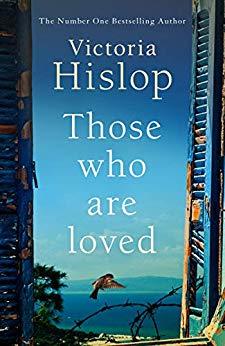
Headline Review|30 May 2019|496 pages|Review e-book copy|4.5*
Those Who Are Loved by Victoria Hislop is one of the most moving novels I’ve read for a long time. But it begins slowly and it was only at about the halfway stage that it really took off for me. And now I’ve come to write about it I’m finding it difficult to put into words just how exceptional I think it is. Whatever I write will not do it justice – it really is ‘an epic tale of an ordinary woman compelled to live an extraordinary life‘.
It is historical fiction ‘set against the backdrop of the German occupation of Greece, the subsequent civil war and a military dictatorship, all of which left deep scars.’
The main character is Themis Koralis/Stravidis (in Greek mythology Themis is the personification of fairness and natural law). In 2016 she is a great grandmother and realising that her grandchildren knew very little about Greek history she decided to tell them her life story, beginning from when she was a small child in the 1930s, through the German occupation of Greece during the Second World War, the civil war that followed, then the oppressive rule of the military junta and the abolition of the Greek monarchy, up to the present day.
As she grew up she and her brothers and sister had many disagreements, holding differing political opinions, which came to a head when the Germans invaded Athens in 1941. Themis and her brother Panos joined the communist party in their fight against the Germans, whilst her other brother Thanasis and her sister Margarita opposed them, hating the communists’ views and believing that Germany was a friend of Greece, not a foe.
During the civil war Themis was imprisoned on the islands of exile, Makronisos and then Trikeri. Her experiences were horrific, but only strengthened her determination to survive. On Makronisos she met Aliki, also a member of the communist party, and when Aliki is condemned to death, Themis promises to find and raise Aliki’s son, Nikos as her own.
During the early part of the book I felt it was rather like reading a history book. But then, the book sprang to life, the pace increased, and I was totally gripped and moved as history and fiction came together dramatically in glorious technicolor, telling the story of the characters personal lives and their parts in the action.
I have only skimmed the surface of this book – there is so much more to the story than I can mention here. But after the slow start I loved it, even though it is not a book I can say I ‘enjoyed’. It is a powerful and shocking story of remarkable characters faced with brutal and traumatic events. It has a completely convincing and vivid sense of location. I knew next to nothing about this period in Greek history before and I was astounded by what I learnt.
On a personal note, the earthquake in Athens on 7 September 1999 plays a part in the story. We were there then on holiday. We had been out at sea on that day and travelled back to our hotel through Athens, seeing some of the destruction and terror it caused. The earthquake had been felt at our hotel in Marathon – people had been thrown out of the swimming pool and later that evening we could still feel the aftershocks.
Many thanks to the publishers, Headline Review, for my review copy via NetGalley.
What a frightening experience that earthquake must have been, Margaret! I’m not surprised you found a connection to the story because of it. It sounds like an absorbing read, too. I always do love a personal look at history. It makes the larger events feel more real to me.
LikeLiked by 1 person
It was scary, Margot! especially seeing all the damage and chaos it caused and then feeling the aftershocks.
LikeLiked by 1 person
I’ve kind of given up on Hislop. Too much detail and the characters feel.. flat to me. But I see you liked this one.
LikeLike
I don’t think this one is for you – it’s full of detail, but I thought the characters really did come to life.
LikeLiked by 1 person
I do love Greece and this book sounds interesting, I know little of that period and the fighting between the Communists and Nazis there. How frightening to experience the recent earthquake; I have been through one big one here in California.
LikeLike
I will be reading this soon as it’s on my 20 Books of Summer list, so I’m pleased to see such a positive review from you! I’m not very familiar with this period of Greek history either so I’ll look forward to learning more about it – and will be prepared for the slow start.
LikeLike
This sounds interesting despite the slow start, and I’d like to know more about the various countries of Europe between the war instead of always concentrating on Britain, France and Germany. Gosh, the earthquake sounds scary! We forget how lucky we are to live in a country where persistent rain is about the worst we have to put up with…
LikeLike